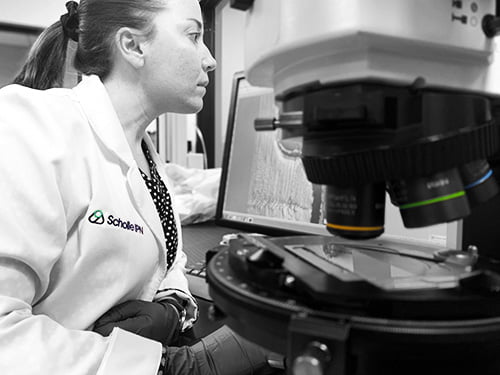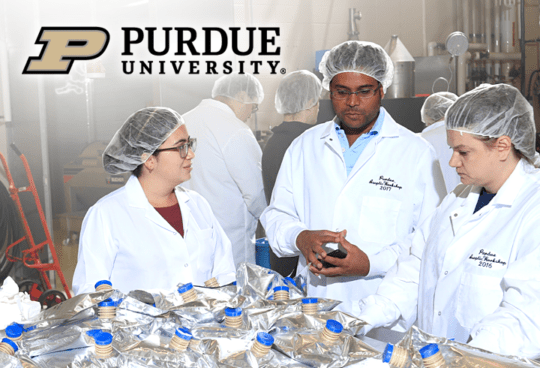Leading the Way in Materials Science
In our quest to be the best total flexible packaging solutions supplier, we developed a fully-equipped Materials Science Lab where we design and rigorously test all our latest innovations. Staffed by a team of leading chemists, engineers, and scientists, our lab, located at our headquarters in Northlake, Illinois, supports all Scholle IPN locations across the globe and drives forward the future of flexible packaging.
A Scientific Approach
 Every single item we make for flexible packaging goes through our Materials Science lab. We use a scientific approach, paired with state-of-the-art equipment and protocols, to test a variety of products, from aseptic packaging for dairy to fitments for battery acid. Our goal is to make sure every Scholle IPN product is designed safely and can withstand real-world conditions.
Every single item we make for flexible packaging goes through our Materials Science lab. We use a scientific approach, paired with state-of-the-art equipment and protocols, to test a variety of products, from aseptic packaging for dairy to fitments for battery acid. Our goal is to make sure every Scholle IPN product is designed safely and can withstand real-world conditions.
Our Approach to Testing and Support
Research and Development
Our labs work closely with product development engineers to confirm production and functional specifications for new fitment and film innovations through extensive testing protocols.
Manufacturing Support
We are constantly working to find a simpler way to make products. The lab determines if new film and fitment upgrades meet specifications and confirms quality at every step of the production process.
Commercial Support
Ensuring product and package compatibility is critical to success. The labs perform sensory, shelf-life, and ship testing for all new innovations or any application change our customers explore.
Quality Support
Our labs use a number of mechanical, chemical, and application tests to determine the root cause of any quality issues and to guide R&D teams toward designing the best flexible packaging possible.
Partners in Innovation
 Our Materials Science Lab is just one way we’ve invested in the future of flexible packaging technology. For decades, we’ve partnered with Purdue University’s Department of Food Science to work alongside leading researchers and invest in the next generation of packaging solutions.
Our Materials Science Lab is just one way we’ve invested in the future of flexible packaging technology. For decades, we’ve partnered with Purdue University’s Department of Food Science to work alongside leading researchers and invest in the next generation of packaging solutions.
Our founder, William R. Scholle graduated from Purdue in 1938. In the last 80 years, we’ve funded an endowed chair in the Food Science department, donated equipment and resources, and participated in an annual aseptic processing and packaging training workshop that’s been ongoing for the last 35 years. Together, we’re setting the foundation for new thinkers and innovators from around the globe to invest in and explore the future of flexible packaging.
You can read more about our longstanding relationship with Purdue here.
Behind the Scenes
 On any given day, you can walk into our Materials Science Lab and see a number of different tests and experiments. You might see one of our scientists conducting a vibration test, which is meant to mimic how a delivery truck might impact the integrity and durability of our bag-in-box films. Or you might see another looking into product color retention in a newly-designed pouch. Everyday is different, but our scientists are always driven by one goal: to provide our customers with safe, reliable, and sustainable products.
On any given day, you can walk into our Materials Science Lab and see a number of different tests and experiments. You might see one of our scientists conducting a vibration test, which is meant to mimic how a delivery truck might impact the integrity and durability of our bag-in-box films. Or you might see another looking into product color retention in a newly-designed pouch. Everyday is different, but our scientists are always driven by one goal: to provide our customers with safe, reliable, and sustainable products.
The Materials Science Lab is highly adaptive and brings in new technologies and tools to test products as we develop products for our growing client base. One of our 5 Core Values is continuous improvement and innovation, and our Materials Science Lab is the nexus of this commitment to new and emerging flexible packaging solutions.
Go deeper behind the scenes at Materials Science Lab and get to know some of the scientists making the next wave of films, fitments, and pouches here.
Our Testing Capabilities
Scholle IPN scientists use tools to mimic real-world conditions for all of our films, fitments, and pouches. Our testing covers a wide range of possible scenarios to ensure consumers are getting safe and reliable products.
From testing the durability of a bag-in-box package to replicating shipping and distribution scenarios, our lab has created exhaustive tests meant to represent different points in the life of a flexible package. No matter the point in the life cycle of a flexible package, we’ve developed a test to assess its durability and performance.
